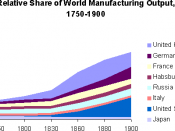In the eighteenth and nineteenth centuries, industrialization revolutionized the European economy in positive and negative ways.
The Industrial Revolution was the start of large-scale economic growth. Since the late eighteenth century, the European economy has been able to grow without interference. Depressions and other disruptions, even wars, had been short-lived, and European nations were always able to get past them. This was something new to the world because before industrialization, growth would be short-lived and would soon begin to level off. But now, growth was nonstop and no iceberg could halt industrialization's maiden voyage.
Industrialization made it possible for the production of more goods and services than ever before. It made it conceivable for the economy to always have supplies and never run out. The Revolution opened the gates for new skills, new work disciplines, and more workers. These changes set the standard for more demands by consumers and manufacturers.
Industrialization gave people more control over life and raised their overall standard of living. However, it caused environmental and social problems, such as crime and child labor, no society was prepared to handle. (Western Heritage, 565) In the eighteenth century, the factory system transformed the manufacture of British cotton and featured new methods of production, such as, James Kay's flying shuttle and James Hargreaves' spinning jenny. Other advances were being made at the same time in other fields, all opening the doors to a better and more productive world, like the steam engines of Thomas Newcomen and the improvements made on the steam engine by James Watt and Matthew Boulton. The improvements substituted machinery for human skill, getting practically unlimited supplies of energy, mainly coal, and using new and improved raw materials, cotton, for example, over wool and linen. These substitutions led to a rapid rise in productivity and increased...


